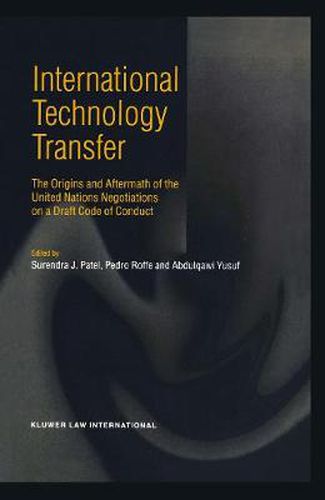Readings Newsletter
Become a Readings Member to make your shopping experience even easier.
Sign in or sign up for free!
You’re not far away from qualifying for FREE standard shipping within Australia
You’ve qualified for FREE standard shipping within Australia
The cart is loading…






This title is printed to order. This book may have been self-published. If so, we cannot guarantee the quality of the content. In the main most books will have gone through the editing process however some may not. We therefore suggest that you be aware of this before ordering this book. If in doubt check either the author or publisher’s details as we are unable to accept any returns unless they are faulty. Please contact us if you have any questions.
The distribution of technology among enterprises and nations lies at the heart of international economic relations, affecting trade, investment, finance and economic policies, and is affected in turn by the political relations between nations. The need for effective transfer of technology to developing countries has acquired renewed urgency in recent years as production becomes increasingly knowledge-intensive and competition is determined more and more by the ability of enterprises to learn, to acquire and use knowledge, and to innovate. Access to knowledge has become key to economic success in the marketplace. This text discusses the background, objectives, approaches and progress achieved in the decade-long negotiations on an International Code of Conduct on the Transfer of Technology which took place under the aegis of UNCTAD. It examines the impact and continued relevance of the Code negotiations to subsequent policy and legislative instruments on international technology transfer, both at domestic and international levels, and identifies and examine emerging trends and negotiating agendas that will help to shape the future of international technological co-operation. The central question posed by the initiators of the Draft Code of Conduct is still relevant today - how can we facilitate a just and mutually beneficial system of technology flow in a world of rapid change and increasing gaps in the technological capability of developed and developing countries? The need for marginalized countries to access knowledge in order to learn, adjust and integrate effectively into the world economic system must be balanced with the vital need to reward inventors and innovators to ensure the continued generation of knowledge. It is these issues that will continue to dominate any future discussion on the international transfer of technology. This book will be a valuable work of reference on the evolution of international technological cooperation in the last quarter of the 20th century, as well as a useful guide to policymakers, scholars and international negotiators dealing with these and related issues of international economic cooperation.
$9.00 standard shipping within Australia
FREE standard shipping within Australia for orders over $100.00
Express & International shipping calculated at checkout
Stock availability can be subject to change without notice. We recommend calling the shop or contacting our online team to check availability of low stock items. Please see our Shopping Online page for more details.
This title is printed to order. This book may have been self-published. If so, we cannot guarantee the quality of the content. In the main most books will have gone through the editing process however some may not. We therefore suggest that you be aware of this before ordering this book. If in doubt check either the author or publisher’s details as we are unable to accept any returns unless they are faulty. Please contact us if you have any questions.
The distribution of technology among enterprises and nations lies at the heart of international economic relations, affecting trade, investment, finance and economic policies, and is affected in turn by the political relations between nations. The need for effective transfer of technology to developing countries has acquired renewed urgency in recent years as production becomes increasingly knowledge-intensive and competition is determined more and more by the ability of enterprises to learn, to acquire and use knowledge, and to innovate. Access to knowledge has become key to economic success in the marketplace. This text discusses the background, objectives, approaches and progress achieved in the decade-long negotiations on an International Code of Conduct on the Transfer of Technology which took place under the aegis of UNCTAD. It examines the impact and continued relevance of the Code negotiations to subsequent policy and legislative instruments on international technology transfer, both at domestic and international levels, and identifies and examine emerging trends and negotiating agendas that will help to shape the future of international technological co-operation. The central question posed by the initiators of the Draft Code of Conduct is still relevant today - how can we facilitate a just and mutually beneficial system of technology flow in a world of rapid change and increasing gaps in the technological capability of developed and developing countries? The need for marginalized countries to access knowledge in order to learn, adjust and integrate effectively into the world economic system must be balanced with the vital need to reward inventors and innovators to ensure the continued generation of knowledge. It is these issues that will continue to dominate any future discussion on the international transfer of technology. This book will be a valuable work of reference on the evolution of international technological cooperation in the last quarter of the 20th century, as well as a useful guide to policymakers, scholars and international negotiators dealing with these and related issues of international economic cooperation.